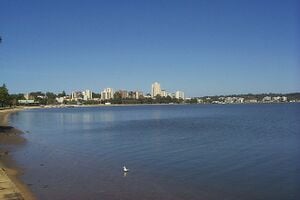
Biodiversity[edit | edit source]
Gondwana Link is one of the largest and most ambitious conservation projects proposed in Australia’s history.
Designed to protect and restore the ecological integrity of land areas across south-west Western Australia, a biodiversity hotspot, the completed link will be a continuous stretch of reconnected bushland stretching for a 1000 km from the wet forests in the State’s far southwest to the dry woodlands and shrublands bordering the Nullarbor Plain.
Education for sustainability[edit | edit source]
Sustainable transport activism[edit | edit source]
TravelSmart / Living Smart, information from the Department of Transport, WA Government
Peter William Geoffrey Newman (born 1945) is an environmental scientist, author and educator based in Perth, Western Australia. He is currently Professor of Sustainability at Curtin University. He is best known for his contributions to the development of Perth's electrified metropolitan rail network through both activist and official consulting roles since the 1980s.
Newman has written 20 books and over 330 papers on sustainable cities and is most known for creating the term "automobile dependence" in the second half of the 1980s. He was closely associated with community opposition to the closure of the Fremantle Railway in 1979 and subsequent redevelopment of the metropolitan rail system from 1983 to the present. He is a lead author for transport on the Intergovernmental Panel on Climate Change.
He has a PhD degree in chemistry (1972, University of Western Australia) and completed post doctoral studies in Environmental Science, Delft University, Dip EST, Environmental Science, 1972.
News and comment[edit | edit source]
2018
Tesla battery will power unusual community storage project in Western Australia, Jul 11[1]
Perth council cuts red tape to allow residents to plant fruit and veg in public parks, Feb 7[2]
2017
Blackout parties: how solar and storage made Western Australia farmers the most popular in town, May 15[3]
2016
Kalbarri to host what could be Australia's largest renewable energy grid, Nov 28[4]
2014
City of Fremantle to divest from carbon intensive investments, November 14[5]
City of Fremantle – On Becoming a One Planet Council, October 8[6]
Campaigns[edit | edit source]
About Western Australia[edit | edit source]
Western Australia (commonly abbreviated as WA) is a state of Australia occupying the western third of the land area of Australia, excluding external territories. It is bounded by the Indian Ocean to the north and west, the Southern Ocean to the south, the Northern Territory to the north-east, and South Australia to the south-east. Western Australia is Australia's largest state, with a total land area of 2,527,013 square kilometres (975,685 sq mi). It is the second-largest country subdivision in the world, surpassed only by Russia's Sakha Republic. As of 2021, the state has 2.76 million inhabitants—11 percent of the national total. The vast majority (92 percent) live in the south-west corner; 79 percent of the population lives in the Perth area, leaving the remainder of the state sparsely populated.
References
